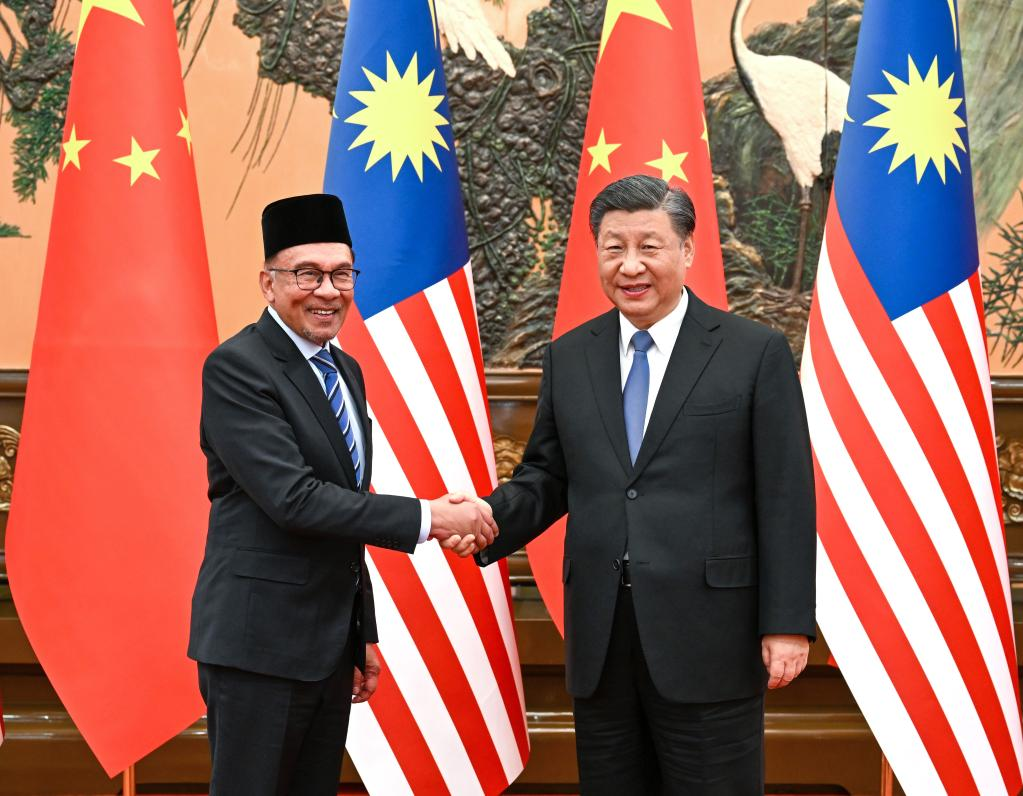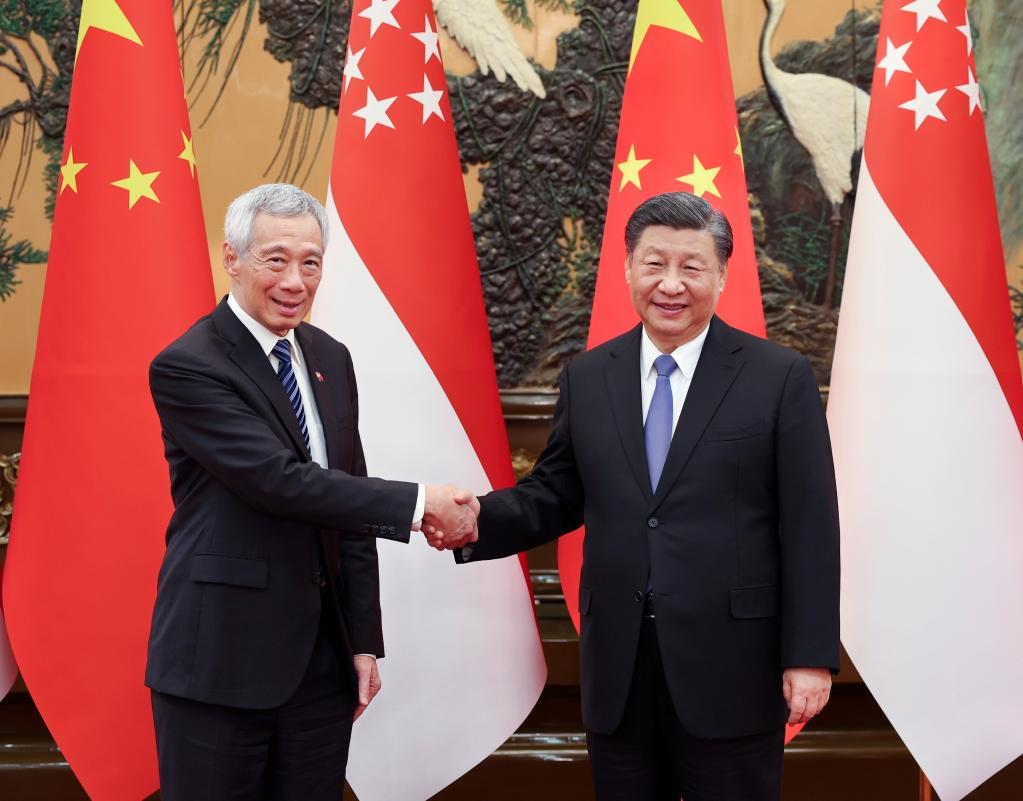The Great Hall of the People in Beijing saw a busy Friday as Chinese top leader met with leaders of Spain, Malaysia and Singapore to further boost bilateral relations and exchange views on topics of shared concern, with experts pointing out that the interactions among top leaders after the Boao Forum for Asia (BFA) Annual Conference will inject positive impetus into the region and the world amid a growing geopolitical crisis.
On Friday, Chinese President Xi Jinping met with Spanish Prime Minister Pedro Sanchez, Malaysia’s Prime Minister Datuk Seri Anwar Ibrahim and Singapore’s Prime Minister Lee Hsien Loong in Beijing.

Chinese President Xi Jinping meets with Malaysia’s Prime Minister Datuk Seri Anwar Ibrahim at the Great Hall of the People in Beijing, capital of China, March 31, 2023. Photo:Xinhua
Deepening cooperation
During the meetings especially with two foreign guests from ASEAN, leaders also stressed upholding multilateralism and deepening cooperation in boosting regional and global development, vowing to support the core position of ASEAN and reject Cold War mentality and bloc confrontation. This strong momentum shows that the cooperation between China and ASEAN won’t be affected by US-led decoupling moves, as such cooperation is rooted in the fundamental interests of the two sides, experts said.
During Anwar’s visit, China and Malaysia reached a consensus to jointly build a China-Malaysia community with a shared future, which will surely open a new chapter in the history of bilateral relations, Xi said.
He called on the two sides to make coordinated efforts to advance the development of bilateral relations and cooperation in various fields in the next stage, push for steady and sustained growth of China-Malaysia relations, and inject new impetus into the prosperity and development of the two countries and the region at large.
China’s unswerving pursuit of high-standard opening-up and Chinese modernization will bring new opportunities for the development of Malaysia and other countries, Xi said, calling on the two sides to continue to raise the level of high-quality Belt and Road cooperation, advance key projects, foster growth areas in the digital economy, green development and new energy, and explore cooperation on people’s livelihoods so that China-Malaysia relations will bring more benefits to the two peoples.
The Chinese President also emphasized that China is willing to work with Malaysia to support the core position of ASEAN, rejecting the Cold War mentality and camp confrontation.
Anwar said that the China-proposed Global Security Initiative (GSI), Global Development Initiative (GDI) and Global Civilization Initiative (GCI) echo Malaysia Madani – a policy framework that focuses on good governance and sustainable development. He also recognized China’s protection of mosques and respect for freedom of religious belief, and said Malaysia is willing to deepen dialogue on civilization with China.
China recently successfully brokered the Iran-Saudi Arabia dialogue in Beijing, which also showed that it is playing a constructive role in promoting peace. Malaysia opposes bloc confrontation and being forced to “pick sides,” Anwar said.

Chinese President Xi Jinping meets with Singaporean Prime Minister Lee Hsien Loong in Beijing, capital of China, March 31, 2023. Photo:Xinhua
During a meeting between Xi and Lee, the two leaders also stressed the importance of safeguarding the benefits of regional peace and development and of firmly rejecting hegemony and decoupling.
Xi said China gives diplomatic priority to Singapore in its neighborhood diplomacy. He noted that during Lee’s visit, the two sides elevated bilateral ties to an all-round high-quality future-oriented partnership, charting the course for the future development of bilateral relations.
China is ready to strengthen strategic communication with the Singaporean side, deepen strategic alignment, and make “high quality” the most distinct feature of China-Singapore cooperation, said the Chinese President.
Against the backdrop of accelerating changes in the world unseen in a century, Xi said Asian countries should cherish and maintain the hard-won sound momentum of development in the region, jointly safeguard the peace dividend of the region, maintain the right direction of economic globalization and regional economic integration, and firmly oppose bullying, decoupling or severing the supply and industrial chains.
“No country should be allowed to deprive the people of Asia of their right to pursue a better and happier life,” Xi said.
Lee said he has firm confidence in the resilience of the Chinese economy and believes that it will further develop. Neighboring countries including Singapore are looking forward to further deepening economic cooperation with China, he said. He also emphasized that even if there is competition, it has to be based on mutual respect and trust and one should not have to pick sides.
While the US has been ramping up efforts in luring ASEAN members to decouple from China by proposing the Indo-Pacific economic framework and boosting military alliance in the region to counter China, the visits of the leaders of major ASEAN members sent a clear signal that China and ASEAN members resist those calls, and will expand cooperation, serving as an example for globalization and regional integration.
Some destructive effects of the US-led unilateral and hegemonic moves won’t stop China-ASEAN cooperation in the long run, as it meets each other’s fundamental interests, experts said.
Southeast Asia was among the first regions to participate in the China-proposed BRI, advocate the GSI and GDI. The two sides have gained many benefits from this cooperation, for example, during the COVID epidemic, trade between China and ASEAN largely grew, which explains why such cooperation won’t be affected by any individual country, Xu Liping, director of the Center for Southeast Asian Studies at the Chinese Academy of Social Sciences, told the Global Times.
“The US-led moves could lead to some destructive impact in the short term, but they won’t disrupt China-ASEAN cooperation in the long run, as such cooperation is also driven by the two sides’ highly complementary economic structures,” Xu said.
On the Taiwan question, Lee emphasized that nearly all countries recognize that there is only one China. Those advocating “today’s Ukraine, tomorrow’s Taiwan” will bring severe consequences, and countries should respect each other and avoid conflicts, and jointly deal with challenges and risks.
High expectations
Some business leaders and industry representatives expect such high-level interactions to further deepen China-Malaysia and China-Singapore economic ties, widening the dividend brought by the Regional Comprehensive Economic Partnership (RCEP) and the BRI.
Low Kian Chuan, chief of the Associated Chinese Chambers of Commerce and Industry of Malaysia (ACCCIM), told the Global Times on Friday that the Malaysian business community has high expectations for the visit and hopes that it will prompt Malaysia-China enterprises to cooperate in more fields and help enterprises from both sides jointly explore the RCEP market.
“The two countries have the potential to achieve more fruitful results in cooperation in industrial parks, infrastructure, 5G communications, digital economy and tourism, and create a win-win situation,” Low said.
Closer cooperation between China and Malaysia could also help boost the revival of the Kuala Lumpur-Singapore high-speed rail project, some experts said, as Malaysian Transport Minister Anthony Loke earlier said he will use the visit to hold discussions with Chinese officials on fostering the existing partnership and exploring new ones.
China has been working with Malaysia on the East Coast Railway Link, a flagship BRI project in the region.
As for China-Singapore cooperation, experts said that bilateral cooperation is now extending from traditional financial services, telecommunications, transportation and real estate to biotechnology, pharmaceutical manufacturing, green development and scientific research and development.
“As an important country along the BRI, Singapore can be a very good partner for China. I am confident that there will be new highlights in future investment cooperation in digital economy, healthcare, biotechnology, green development and new energy,” Liang Haiming, dean of the Hainan University Belt and Road Research Institute, told the Global Times on Friday.






















